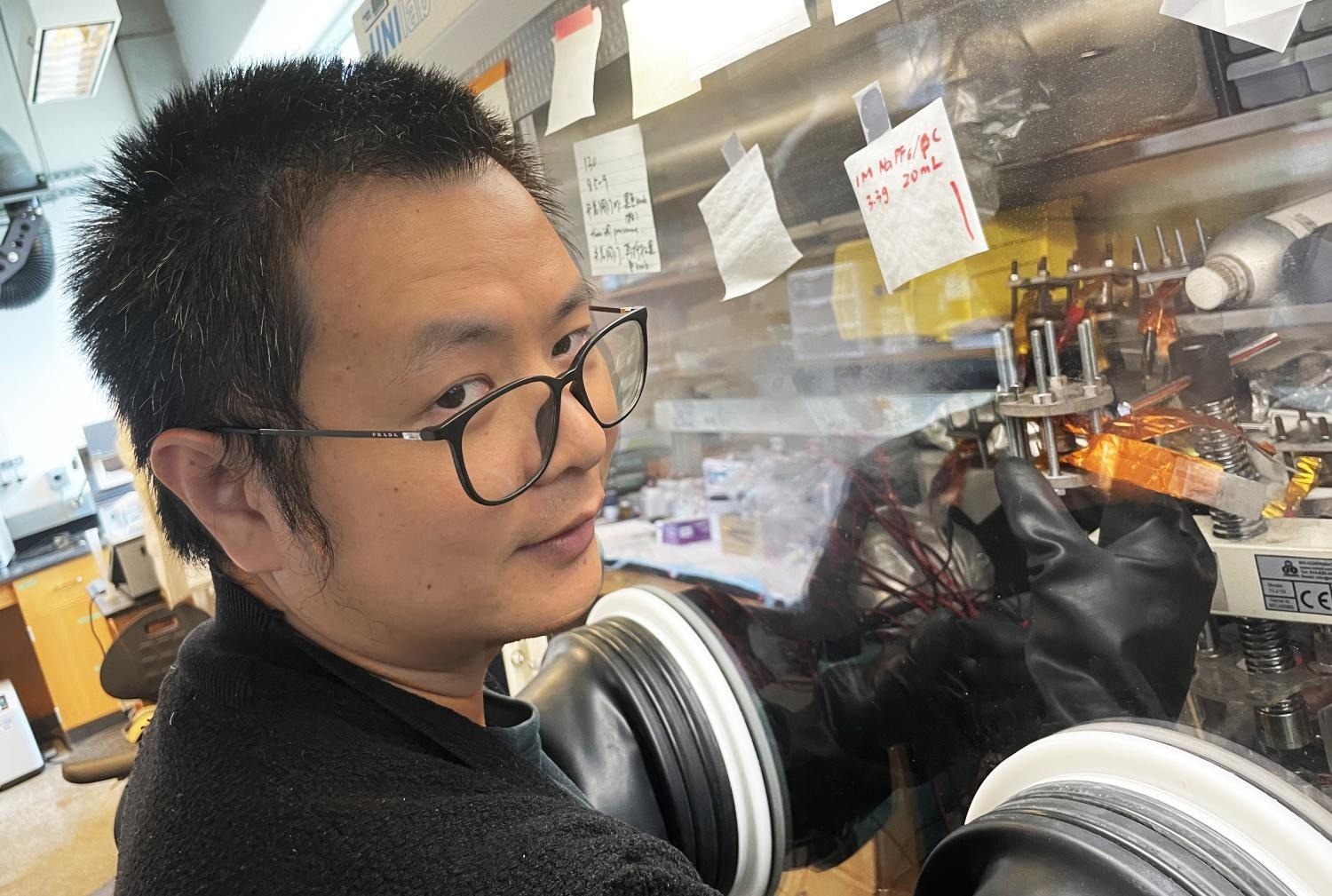Reviewed by Lexie CornerSep 24 2024
According to a study published in Nature Sustainability, a multi-institutional research team led by Hailong Chen from Georgia Tech has developed a new, low-cost cathode that could significantly enhance the performance of lithium-ion batteries (LIBs), potentially transforming the electric vehicle (EV) market and large-scale energy storage systems.
 Zhantao Liu with the new low-cost cathode that could revolutionize lithium-ion batteries and the EV industry. Image Credit: Jerry Grillo
Zhantao Liu with the new low-cost cathode that could revolutionize lithium-ion batteries and the EV industry. Image Credit: Jerry Grillo
For a long time, people have been looking for a lower-cost, more sustainable alternative to existing cathode materials. I think we’ve got one.
Hailong Chen, Associate Professor, Woodruff School of Mechanical Engineering and the School of Materials Science and Engineering, Georgia Institute of Technology
The revolutionary material, iron chloride (FeCl3), costs only 1–2 % of traditional cathode materials and can store the same amount of electricity. Cathode materials influence capacity, energy, and efficiency, all of which significantly impact battery performance, lifespan, and cost.
Chen added, “Our cathode can be a game-changer, whose team describes its work in Nature Sustainability. It would greatly improve the EV market—and the whole lithium-ion battery market.”
LIBs were first commercialized by Sony in the early 1990s, sparking an explosion in personal electronics such as smartphones and tablets. The technology eventually evolved to power electric vehicles, offering a reliable, rechargeable, high-energy-density solution. However, unlike personal electronics, large-scale energy users such as EVs are particularly sensitive to the cost of LIBs.
Batteries constitute roughly half of an EV's total cost, making clean-energy vehicles more expensive than their internal combustion counterparts. The breakthrough by Chen's team could potentially change this.
Building a Better Battery
LIBs store more energy in a smaller package than conventional alkaline and lead-acid batteries, allowing devices to run longer between charges. However, LIBs contain costly metals like cobalt and nickel, making them expensive to manufacture.
Only four cathode types have been successfully commercialized for LIBs to date. Chen's would be the fifth, and it would mark a significant advancement in battery technology: the creation of an all-solid-state LIB.
Conventional LIBs use liquid electrolytes to transport lithium ions for energy storage and release. They have strict limits on the amount of energy that can be stored, and they can leak and catch fire.
However, all-solid-state LIBs use solid electrolytes, significantly improving a battery's efficiency and reliability while making it safer and capable of storing more energy. These batteries, which are still in the development and testing stages, would represent a significant improvement.
Chen and his associates have created an economical and environmentally friendly alternative as scientists and manufacturers worldwide strive to make all-solid-state technology feasible. Their entire battery system, which includes a lithium metal anode, a solid electrolyte, and a FeCl3 cathode, costs between 30 and 40 percent less than existing LIBs.
Chen further stated, “This could not only make EVs much cheaper than internal combustion cars, but it provides a new and promising form of large-scale energy storage, enhancing the resilience of the electrical grid. In addition, our cathode would greatly improve the sustainability and supply chain stability of the EV market.”
Solid Start to New Discovery
Chen’s lab's research into solid electrolyte materials led to an interest in FeCl3 as a cathode material. In 2019, they began trying to develop solid-state batteries by pairing traditional oxide-based cathodes with chloride-based solid electrolytes. However, the cathode and electrolyte materials were not compatible, resulting in poor performance.
The team hypothesized that matching the chloride electrolyte with a chloride-based cathode could improve battery performance.
“We found a candidate (FeCl3) worth trying, as its crystal structure is potentially suitable for storing and transporting Li ions, and fortunately, it functioned as we expected,” added Chen.
Most EV cathodes today are made from oxides, requiring expensive and environmentally challenging elements like nickel and cobalt. In contrast, Chen’s cathode consists only of iron (Fe) and chlorine (Cl), common and inexpensive elements found in table salt and steel.
Initial tests showed that FeCl3 outperformed more costly cathodes, offering a higher operational voltage than the widely used LiFePO4 (lithium iron phosphate, or LFP), which is similar to the water pressure in a garden hose.
This technology could be commercially available in EVs within five years. For the time being, Chen says the team will continue to investigate FeCl3 and related materials.
Chen and postdoc Zhantao Liu led the study. Researchers from Georgia Tech's Woodruff School (Ting Zhu) and the School of Earth and Atmospheric Sciences (Yuanzhi Tang) collaborated, as did Oak Ridge National Laboratory (Jue Liu) and the University of Houston (Shuo Chen).
“We want to make the materials as perfect as possible in the lab and understand the underlying functioning mechanisms. But we are open to opportunities to scale up the technology and push it toward commercial applications,” concluded Chen.
National Science Foundation (Grant Nos. 1706723 and 2108688) funded the study.
Journal Reference:
Liu, Z., et al. (2024) Low-cost iron trichloride cathode for all-solid-state lithium-ion batteries. Nature Sustainability. doi.org/10.1038/s41893-024-01431-6